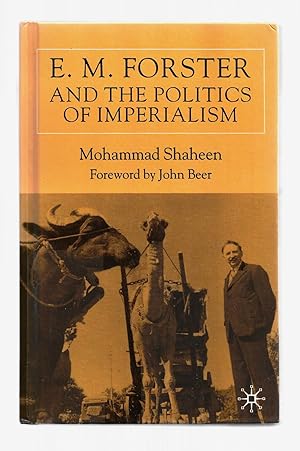mohammad shaheen john beer (1 Ergebnisse)
Produktart
- Alle Produktarten
- Bücher (1)
- Magazine & Zeitschriften
- Comics
- Noten
- Kunst, Grafik & Poster
- Fotografien
- Karten
-
Manuskripte &
Papierantiquitäten
Zustand
- Alle
- Neu
- Antiquarisch/Gebraucht
Einband
- alle Einbände
- Hardcover
- Softcover
Weitere Eigenschaften
- Erstausgabe
- Signiert
- Schutzumschlag
- Angebotsfoto
- Kein Print-on-Demand
Land des Verkäufers
Verkäuferbewertung
-
E.M. Forster and The Politics of Imperialism
Verlag: Palgrave Macmillan, 2004
ISBN 10: 0333741366ISBN 13: 9780333741368
Anbieter: killarneybooks, Inagh, CLARE, Irland
Buch
Hardcover. Zustand: Good. Hardcover, xiii + 209 pages. Ex-library, stamped "withdrawn / may be sold"; an external stamp on upper outer page edges, a couple of stamps and stickers on the front blank endpaper, a date and a security sticker inside the rear board. Underlining and marginal markings (brackets) in red pen on fifteen pages; a couple of small grubby marks, else interior is clean, untanned, in nice shape. Good secure binding. Residue of a partially removed label on lower spine. Issued without a dust jacket. -- "This new study by Mohammad Shaheen examines the way in which E. M. Forster presents a complex, cultural engagement of colonial Britain and colonised India in his works. Forster's experience in Egypt during the First World War had a profound impact on his life and writing, and Shaheen here offers a reassessment of that experience. He explores Forster's use of raw materials (including his journalistic writings, essays and letters) in his work and demonstrates how Forster's fiction can be read in the wider contexts of culture and imperialism, and particularly through the tens of Edward Said's views on 'resistance and opposition'." -- In Howards End, Forster remarks that the Imperialist 'hopes to inherit the earth' and with the strong temptation he has to acclaim it 'as a superyeoman, who carries his country's virtue overseas'. He then adds: 'But the Imperialist is not what he thinks or seems. He is a destroyer. He prepares the way for cosmopolitanism, and though his ambitions may be fulfilled the earth that he inherits will be grey'. This simple notion is masterly expressed in A Passage to India , which provides a rich diversity of historical contexts and implies political imperatives urging us to rethink the complex relationship between East and West not as simple confrontation but rather as deeply rooted in cultural differences far beyond the realm of imperialist sensibility. With the support of material by Forster published here for the first time, this volume explores the realm of Forster's politics and imperialism. --- Contents: 1. Person and Persona in the Portrait of Imperialism 2. 'Hassan in England': A Western Room With an Oriental View 3. Forster's Debate on 'Kipling Is Not Literature' 4. Forster Writes to the Empire and Salutes the Orient: A Passage Through Egypt 5. Beyond the Mediterranean Human Norm: The Politics of Liberal Humanism in Retreat 6. Burra's Introduction and Beyond: A Detour Round the Floods 7. Forster's Politics in Said's Culture and Imperialism: A Modern Debate; App. 1. The Government of Egypt; App. 2. Forster's Fictitious Letter to Mohammed El-Adle; App. 3. 'The Horror, the Horror'; App. 4. Unpublished Conversation with E.M. Forster; Notes; Bibliography; Index.


